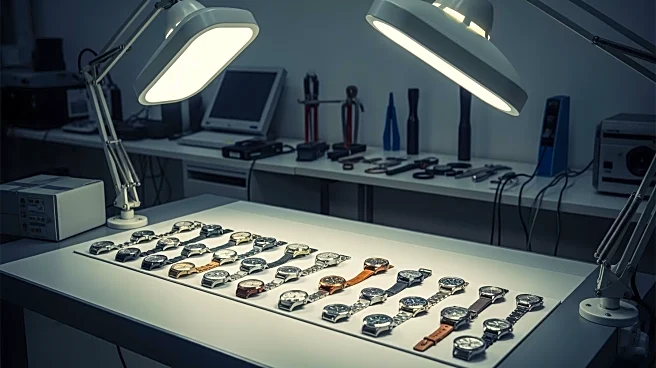What's Happening?
U.S. Customs and Border Protection officers in Louisville intercepted two shipments containing 53 counterfeit watches from Hong Kong on October 28. The counterfeit items, which included brands such as
Richard Mille, Rolex, Hublot, Cartier, Swarovski, G-Shock, and Patek Philippe, were addressed to residences in Union City, Georgia, and Doral, Florida. If genuine, these watches would have had a combined Manufacturer’s Suggested Retail Price of $6.6 million. The seized items have been handed over to Homeland Security Investigations for further examination. The counterfeit watches were identified as bearing unauthorized versions of well-known trademarks by CBP’s Centers of Excellence and Expertise, the agency’s trade experts.
Why It's Important?
The seizure highlights the ongoing issue of intellectual property theft, which poses a significant threat to the U.S. economy by undermining legitimate businesses and funding organized crime. Counterfeit goods not only deceive consumers but also harm trademark holders and manufacturers of genuine products. The illicit profits from such counterfeit operations are often used to support a range of illegal activities globally. This incident underscores the importance of vigilance and enforcement in protecting intellectual property rights, which are crucial for maintaining economic integrity and consumer trust.
What's Next?
The seized counterfeit watches will undergo further inspection by Homeland Security Investigations to determine the full extent of the operation and potentially identify those responsible. This case may lead to increased scrutiny and enforcement actions against similar shipments in the future. Authorities may also work on strengthening international cooperation to combat the production and distribution of counterfeit goods, particularly from regions like China and Hong Kong, which are major sources of such products.
Beyond the Headlines
The broader implications of this seizure include the ethical and legal challenges in combating counterfeit goods. Intellectual property theft not only affects economic stakeholders but also raises questions about consumer safety and the ethical responsibilities of manufacturers and distributors. Long-term, this could lead to stricter regulations and more robust international agreements to protect intellectual property rights.









